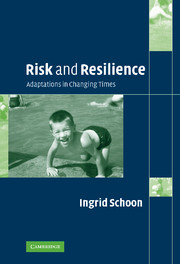Book contents
- Frontmatter
- Contents
- List of figures
- List of tables
- Foreword by Glen H. Elder, Jr
- Preface by John Bynner
- Acknowledgements
- Introduction
- 1 Risk and resilience: definitions
- 2 Towards a developmental-contextual systems model of adjustment
- 3 Persisting inequalities in times of social change
- 4 Selection, causation and cumulative risk effects
- 5 Protective factors and processes
- 6 Stability of early adjustment over time
- 7 Personal goals and life plans
- 8 Conclusions and outlook
- 9 Implications of findings for interventions and social policy
- Appendix A Two British birth cohorts
- Appendix B Response rates and handling of missing data
- Appendix C Description of variables used in the study
- References
- Index
7 - Personal goals and life plans
Published online by Cambridge University Press: 22 September 2009
- Frontmatter
- Contents
- List of figures
- List of tables
- Foreword by Glen H. Elder, Jr
- Preface by John Bynner
- Acknowledgements
- Introduction
- 1 Risk and resilience: definitions
- 2 Towards a developmental-contextual systems model of adjustment
- 3 Persisting inequalities in times of social change
- 4 Selection, causation and cumulative risk effects
- 5 Protective factors and processes
- 6 Stability of early adjustment over time
- 7 Personal goals and life plans
- 8 Conclusions and outlook
- 9 Implications of findings for interventions and social policy
- Appendix A Two British birth cohorts
- Appendix B Response rates and handling of missing data
- Appendix C Description of variables used in the study
- References
- Index
Summary
‘If I had talked with a middle class accent I could have maybe got there… Yes, I want an education… yes, I want a degree… I want to travel abroad…. I want a lot of money, I want success, self-achievement. I want not a problem free life but a worthwhile life, I want to think that I have lived my life to its full… potential. I want to be self-reliant, I want to have self-respect, a good self-esteem and good confidence. I want good friends, want a happy family, I want the best for my children…’
(Eighteen-year old female quoted in Monica Barry (2001))The aim of this chapter is to investigate the role of future-orientated aspirations in moderating the link between early socio-economic adversity, academic attainment during adolescence and adult social status. The specific focus lies on constellations of educational and career aspirations, which can also be understood as achievement orientations. This chapter assesses whether aspirations have changed for the two birth cohorts, whether teenage aspirations are associated with educational attainment despite the experience of adversity and whether teenage aspirations are predictive of adult attainment among both high- and low-risk individuals. The relative importance of parental support and involvement in shaping adolescent adjustment will also be examined.
Adolescence is a crucial phase or period in the life course when a young person becomes ready to assume adult responsibilities. It marks the transition from dependent childhood to independent adulthood.
- Type
- Chapter
- Information
- Risk and ResilienceAdaptations in Changing Times, pp. 122 - 138Publisher: Cambridge University PressPrint publication year: 2006



